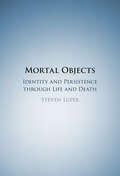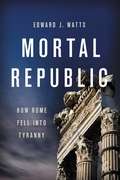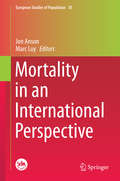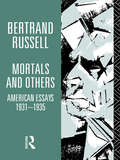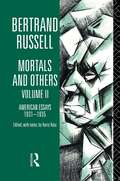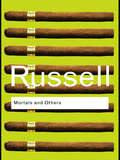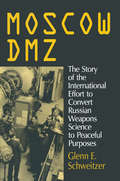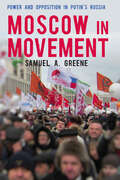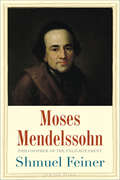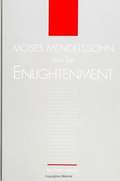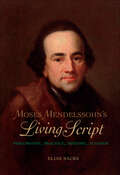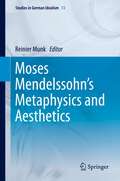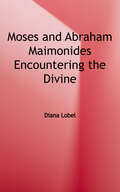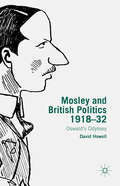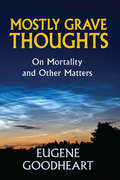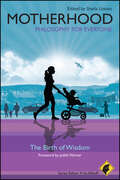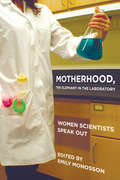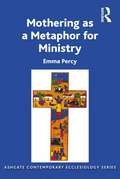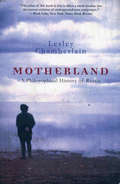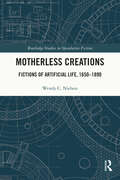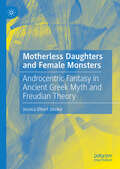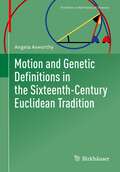- Table View
- List View
Mortal Objects: Identity and Persistence through Life and Death
by Steven LuperHow might we change ourselves without ending our existence? What could we become, if we had access to an advanced form of bioengineering that allowed us dramatically to alter our genome? Could we remain in existence after ceasing to be alive? What is it to be human? Might we still exist after changing ourselves into something that is not human? What is the significance of human extinction? Steven Luper addresses these questions and more in this thought-provoking study. He defends an animalist account, which says that we are organisms, but claims that we are also material objects. His book goes to the heart of the most complex questions about what we are and what we might become. Using case studies from the life sciences as well as thought experiments, Luper develops a new way of thinking about the nature of life and death, and whether and how human extinction matters.
Mortal Questions
by Thomas NagelThomas Nagel's Mortal Questions explores some fundamental issues concerning the meaning, nature and value of human life. Questions about our attitudes to death, sexual behaviour, social inequality, war and political power are shown to lead to more obviously philosophical problems about personal identity, consciousness, freedom, and value. This original and illuminating book aims at a form of understanding that is both theoretical and personal in its lively engagement with what are literally issues of life and death.
Mortal Republic: How Rome Fell into Tyranny
by Edward J. WattsA new history of the Roman Republic and its collapse In Mortal Republic, prize-winning historian Edward J. Watts offers a new history of the fall of the Roman Republic that explains why Rome exchanged freedom for autocracy. For centuries, even as Rome grew into the Mediterranean's premier military and political power, its governing institutions, parliamentary rules, and political customs successfully fostered negotiation and compromise. By the 130s BC, however, Rome's leaders increasingly used these same tools to cynically pursue individual gain and obstruct their opponents. As the center decayed and dysfunction grew, arguments between politicians gave way to political violence in the streets. The stage was set for destructive civil wars--and ultimately the imperial reign of Augustus. The death of Rome's Republic was not inevitable. In Mortal Republic, Watts shows it died because it was allowed to, from thousands of small wounds inflicted by Romans who assumed that it would last forever.
Mortality in an International Perspective
by Jon Anson Marc LuyThis volume presents a state of the art coverage of the measurement and evolution of mortality over time. It describes in great detail the changes in the cause patterns of mortality, the changes in mortality patterns at different ages, and specific analyses of mortality in particular countries. Derived from a meeting of the European Working Group on Health, Morbidity and Mortality held at the Vienna Institute of Demography, September 2011, it presents a cross-section of the work and concerns of mortality researchers across Europe, ranging from London and Madrid in the west to Moscow in the east, with a few additions from further afield. Although most of the papers focus on a particular population, the range of the papers is broad; taken together they present an inter-disciplinary cross-section of this multi-faceted field. Coverage includes estimating life expectancy in small areas, with an application to recent changes in US counties; socioeconomic determinants of mortality in Europe using the latest available data and short-term forecasts; predicting mortality from profiles of biological risk and performance measures of functioning; infant mortality measurement and rate of progress on international commitment using evidence from Argentina; avoidable factors contributing to maternal deaths in Turkey; changes in mortality at older ages: the case of Spain (1975- 2006); variable scales of avoidable mortality within the Russian population; long-term mortality decline in East Asia, and much more. Perspectives in Mortality Research will serve as a valuable resource for professionals and students in sociology, demography, public health and personal finance.
Mortals and Others, Volume I: American Essays 1931-1935
by Bertrand RussellThis collection of essays and journalism cover a wide range of topics, from balancing prosperity and public expenditure or the mental differences between boys and girls to 'who may use lipstick'. Mortal and Others shows the serious and non-serious side of Russell's personality and work. It provides a lively and revealing introduction to Russell's thought for all readers. First published in 1975, Mortals and Others is at last available in paperback with a new introduction by John Slater.
Mortals and Others, Volume II: American Essays 1931-1935 (Routledge Classics Ser.)
by Bertrand Russell Harry Ruja'Every man would like to be God, if it were possible; some few find it difficult to admit the impossibility.' - Bertrand Russell From 1931-1935 Bertrand Russell was one of the regular contributors to the literary pages of the New York American, together with other distinguished authors, such as Aldous Huxley and Vita Sackville-West. Mortals and Others Volume II presents a further selection of his essays, ranging from the politically correct, to the perfectly obscure: from The Prospects of Democracy to Men Versus Insects. Even though written in the politically heated climate of the 1930s, these essays are surprisingly topical and engaging for the present day reader. Volume II of Mortals and Others serves as a splendid, fresh introduction to the compassionate eclecticism of Bertrand Russell's mind.
Mortals and Others: American Essays 1931-1935 (Routledge Classics Ser.)
by Bertrand RussellBetween 1931 and 1935, Bertrand Russell contributed some 156 essays to the literary pages of the American newspaper New York American. These were often fun, humorous observations on the very real issues of the day, such as the Depression, the rise of Nazism and Prohibition, to more perennial themes such as love, parenthood, education and friendship. Available for the first time in the Routledge Classics series in a single volume, this pithy, provocative and often-personal collection of essays brings together the very best of Russell’s many contributions to the New York American, and proves just as engaging for today’s readers as they were in the 1930s.
Moscow DMZ: The Story of the International Effort to Convert Russian Weapons Science to Peaceful Purposes
by Glenn E. SchweitzerAs the Soviet Union was collapsing in late 1991, reports began to reach the West about agents "shopping" for weapons systems - and weapons scientists - in the beleaguered Soviet military-industrial complex. In response, the United States, the European Community, and Japan, in cooperation with the Russian government, created a program to reemploy Soviet scientific personnel in civilian projects dealing with the legacy of the Soviet system - a polluted environment, unsafe nuclear power facilities, and economic underdevelopment. In this fascinating first-person account, the American environmental scientist who led the effort to establish the International Science and Technology Center in Moscow tells the diplomatic, scientific, and human story behind a remarkable post-Cold War conversion initiative.
Moscow in Movement: Power and Opposition in Putin's Russia
by Samuel A. GreeneMoscow in Movement is the first exhaustive study of social movements, protest, and the state-society relationship in Vladimir Putin's Russia. Beginning in 2005 and running through the summer of 2013, the book traces the evolution of the relationship between citizens and their state through a series of in-depth case studies, explaining how Russians mobilized to defend human and civil rights, the environment, and individual and group interests: a process that culminated in the dramatic election protests of 2011–2012 and their aftermath. To understand where this surprising mobilization came from, and what it might mean for Russia's political future, the author looks beyond blanket arguments about the impact of low levels of trust, the weight of the Soviet legacy, or authoritarian repression, and finds an active and boisterous citizenry that nevertheless struggles to gain traction against a ruling elite that would prefer to ignore them. On a broader level, the core argument of this volume is that political elites, by structuring the political arena, exert a decisive influence on the patterns of collective behavior that make up civil society—and the author seeks to test this theory by applying it to observable facts in historical and comparative perspective. Moscow in Movement will be of interest to anyone looking for a bottom-up, citizens' eye view of recent Russian history, and especially to scholars and students of contemporary Russian politics and society, comparative politics, and sociology.
Moses Mendelssohn Sage of Modernity
by Shmuel FeinerThe "German Socrates," Moses Mendelssohn (1729-1786) was the most influential Jewish thinker of the eighteenth and nineteenth centuries. A Berlin celebrity and a major figure in the Enlightenment, revered by Immanuel Kant, Mendelssohn suffered the indignities common to Jews of his time while formulating the philosophical foundations of a modern Judaism suited for a new age. His most influential books included the groundbreakingJerusalemand a translation of the Bible into German that paved the way for generations of Jews to master the language of the larger culture. Feiner's book is the first that offers a full, human portrait of this fascinating man--uncommonly modest, acutely aware of his task as an intellectual pioneer, shrewd, traditionally Jewish, yet thoroughly conversant with the world around him--providing a vivid sense of Mendelssohn's daily life as well as of his philosophical endeavors. Feiner, a leading scholar of Jewish intellectual history, examines Mendelssohn as father and husband, as a friend (Mendelssohn's long-standing friendship with the German dramatist Gotthold Ephraim Lessing was seen as a model for Jews and non-Jews worldwide), as a tireless advocate for his people, and as an equally indefatigable spokesman for the paramount importance of intellectual independence.
Moses Mendelssohn and the Enlightenment
by Allan ArkushArkush (Judaic studies, State U. of New York at Binghamton) discusses the relationship between Mendelssohn's philosophical rationalism and his Judaism, and places his thought within the context of the Leibnizian-Wolffian school, the writings of Kant, and within the tradition of Jewish rationalism. Arkush questions the extent to which Mendelssohn succeeded in reconciling the philosophy of the Enlightenment with his adherence to Judaism.
Moses Mendelssohn's Living Script: Philosophy, Practice, History, Judaism
by Elias SacksMoses Mendelssohn (1729–1786) is often described as the founder of modern Jewish thought and as a leading philosopher of the late Enlightenment. One of Mendelssohn's main concerns was how to conceive of the relationship between Judaism, philosophy, and the civic life of a modern state. Elias Sacks explores Mendelssohn's landmark account of Jewish practice—Judaism's "living script," to use his famous phrase—to present a broader reading of Mendelssohn's writings and extend inquiry into conversations about modernity and religion. By studying Mendelssohn's thought in these dimensions, Sacks suggests that he shows a deep concern with history. Sacks affords a view of a foundational moment in Jewish modernity and forwards new ways of thinking about ritual practice, the development of traditions, and the role of religion in society.
Moses Mendelssohn's Metaphysics and Aesthetics
by Reinier MunkThis book presents an extended dialogue in essay form between specialists in the work of Moses Mendelssohn, and experts in important trends in related late-seventeenth and eighteenth century thought. The first group of contributors explores themes in Mendelssohn's metaphysics and aesthetics, presenting both their internal argumentative coherence and their historical context. The second outlines the context of Mendelssohn's views on specific topics, and describes his contribution to the discussion of them. The essays are organized in four sections. The first pairs two essays on Mendelssohn's theory of language and writing. The second section offers three essays addressing a number of topics in Mathematics and philosophy in Mendelssohn. A group of eight essays follows, dealing with Metaphysics in a historical context. The fourth section presents five essays discussing Mendelssohn's Aesthetics in a historical context. Moses Mendelssohn's Metaphysics and Aesthetics arises from a conference held in Amsterdam in 2009, which gathered numerous authorities to address the central theme. Taken together, these eighteen essays present a sophisticated portrait of Mendelssohn, packed with detail and rich in complexity.
Moses and Abraham Maimonides: Encountering the Divine
by Diana LobelMoses Maimonides--a proud heir to the Andalusian tradition of Aristotelian philosophy--crafted a bold and original philosophical interpretation of Torah and Judaism. His son Abraham Maimonides is a fascinating maverick whose Torah commentary mediates between the philosophical interpretations of his father, the contextual approach of Biblical exegetes such as Saadya, and the Sufi-flavored illuminative mysticism of his Egyptian Pietist circle. This pioneering study explores the intersecting approaches of Moses and Abraham Maimonides to the spark of divine illumination and revelation of the divine name Ehyeh asher Ehyeh, "I am that I am / I will be who I will be."
Mosley and British Politics 1918-32: Oswald’s Odyssey
by D. HowellOswald Mosley has been reviled as a fascist and lamented as the lost leader of both Conservative and Labour Parties. Concerned to articulate the demands of the war generation and to pursue an agenda for economic and political modernization his ultimate rejection of existing institutions and practices led him to fascism.
Mostly Grave Thoughts: On Mortality and Other Matters
by Eugene GoodheartIn this new collection, Eugene Goodheart, scholar of English literature, essayist, and public intellectual, reveals himself in a way that will interest readers already familiar with his expansive body of work as well as those new to his writing. Rising above the particular, the essays focus on themes of universal importance. The opening essay, "Whistling in the Dark," is a meditation on the gravest of subjects: aging and mortality. The chapters that follow are a series of reflections on teaching, retirement, illness, marriage, fatherhood, friendship, regret, indignation, sports, and writing-activities that make up a life. The book wrestles with the question of what constitutes the reality of the self in the present when many writers view the self as an illusion. Each essay alludes to writers of the past and present who have addressed the question of what constitutes the self. Looming largest is Montaigne, the inventor of the modern personal essay. This book focuses on universally important subjects, including an individual's place in a community, family, fatherhood, growing older, being Jewish, and friendship. Written in a vividly accessible manner, this book reaches out to a general audience.
Motherhood - Philosophy for Everyone: The Birth of Wisdom (Philosophy for Everyone #43)
by Fritz AllhoffThe complex world of motherhood is here unveiled. Covering issues ranging from whether we should occasionally lie to our children, to the unexpected challenges and complications of being a mother, Motherhood - Philosophy for Everyone offers insightful, serious but often humorous essays that can be enjoyed by everyone - including husbands and fathers. Considers salient philosophical issues relating to pregnancy, birth, babycare, and raising a child Chapters include "The Days and Nights of a New Mother: Existentialism in the Nursery", "The Media Proudly Presents: Lessons' from Celebrity Moms", and "The Off Button: Thought Experiments and Child Control" Contains work from diverse academic perspectives, including economics, psychology, education, English, sociology, women's studies, and theological studies, as well as from nurses and stay-at-home mothers Includes a foreword by Judith Warner, the New York Times columnist ("Domestic Disturbances") and author of Perfect Madness: Motherhood in the Age of Anxiety
Motherhood, the Elephant in the Laboratory: Women Scientists Speak Out
by Emily MonossonAbout half of the undergraduate and roughly 40 percent of graduate degree recipients in science and engineering are women. As increasing numbers of these women pursue research careers in science, many who choose to have children discover the unique difficulties of balancing a professional life in these highly competitive (and often male-dominated) fields with the demands of motherhood. Although this issue directly affects the career advancement of women scientists, it is rarely discussed as a professional concern, leaving individuals to face the dilemma on their own.To address this obvious but unacknowledged crisis-the elephant in the laboratory, according to one scientist-Emily Monosson, an independent toxicologist, has brought together 34 women scientists from overlapping generations and several fields of research-including physics, chemistry, geography, paleontology, and ecology, among others-to share their experiences.From women who began their careers in the 1970s and brought their newborns to work, breastfeeding them under ponchos, to graduate students today, the authors of the candid essays written for this groundbreaking volume reveal a range of career choices: the authors work part-time and full-time; they opt out and then opt back in; they become entrepreneurs and job share; they teach high school and have achieved tenure.The personal stories that comprise Motherhood, the Elephant in the Laboratory not only show the many ways in which women can successfully combine motherhood and a career in science but also address and redefine what it means to be a successful scientist. These valuable narratives encourage institutions of higher education and scientific research to accommodate the needs of scientists who decide to have children.
Mothering as a Metaphor for Ministry (Routledge Contemporary Ecclesiology)
by Emma PercyDrawing together original research which weaves together ideas from theology, philosophy, feminism and writing on mothering and child development, Emma Percy affirms and encourages aspects of good practice in ministry that are in danger of being overlooked because they are neither well-articulated nor valued. Offering a fresh look at parish ministry, this book uses a maternal metaphor to provide an integrated image of being and doing. The metaphor of mothering is used to explore the relational aspect of parish ministry which needs to value particularity and concrete contingent responsiveness. Percy suggests virtues that need to be cultivated to guard against the temptations to intrusive or domineering styles of care on the one hand or passive abnegation of responsibility on the other. Parish ministry cannot be understood in terms of tangible productivity; different ways of understanding success and evaluating priorities need to be developed. The book suggests ways of being ’good enough’ clergy who can find the right balance between caring for people and communities whilst encouraging and acknowledging the maturity of others.
Motherland
by Lesley ChamberlainThis landmark book, by the acclaimed author of Nietzsche in Turin , offers a unique interpretation of Russian history and thought. Lesley Chamberlain, novelist, traveller and historian of ideas, has been pondering the enigma of Russia for over thirty years. She finds that during the last two centuries Russian intellectuals have asked two fundamental questions: 'what makes a good man?' and 'what is the right way to live?' In their attempts to answer these questions, Chamberlain shows how these thinkers neglected the role of the individual, prioritising instead the need to end injustice and autocracy. Motherland is an invaluable introduction to the key Russian thinkers and an eloquently narrated journey in the history of ideas from a highly individual writer.
Motherland: A Philosophical History of Russia
by Lesley ChamberlainIn this “searching intellectual history of modern Russia” (Kirkus), Lesley Chamberlain finds that during the last two centuries Russian intellectuals have asked two fundamental questions: “what makes a good man?” and “what is the right way to live?” In their attempts to answer these questions, these thinkers neglected the role of the individual, prioritizing instead the need to end injustice and autocracy. It was not until the eve of the revolution of 1917 that Russian philosophers came to grips with individualism, only to have this endeavor fragmented and forced underground by the totalitarian century that followed. In Motherland, which includes sections on key pre-Revolutionary philosophers Alexander Herzen, Vissarion Belinsky, Pyotr Chaadaev, Mikhail Bakunin, Nikolai Stankevich, and Ivan Turgenev, Lesley Chamberlain has produced a radical new interpretation of Russian intellectual history that gives a glimpse into the soul of that singular country.
Motherland: A Philosophical History of Russia
by Lesley ChamberlainIn this "searching intellectual history of modern Russia" (Kirkus), Lesley Chamberlain finds that during the last two centuries Russian intellectuals have asked two fundamental questions: "what makes a good man?" and "what is the right way to live?" In their attempts to answer these questions, these thinkers neglected the role of the individual, prioritizing instead the need to end injustice and autocracy. It was not until the eve of the revolution of 1917 that Russian philosophers came to grips with individualism, only to have this endeavor fragmented and forced underground by the totalitarian century that followed. In Motherland, which includes sections on key pre-Revolutionary philosophers Alexander Herzen, Vissarion Belinsky, Pyotr Chaadaev, Mikhail Bakunin, Nikolai Stankevich, and Ivan Turgenev, Lesley Chamberlain has produced a radical new interpretation of Russian intellectual history that gives a glimpse into the soul of that singular country.
Motherless Creations: Fictions of Artificial Life, 1650-1890 (Routledge Studies in Speculative Fiction)
by Wendy C. NielsenThis book explains the elimination of maternal characters in American, British, French, and German literature before 1890 by examining motherless creations: Pygmalion’s statue, Frankenstein’s creature, homunculi, automata, androids, golems, and steam men. These beings typify what is now called artificial life, living systems made through manufactured means. Fantasies about creating life ex-utero were built upon misconceptions about how life began, sustaining pseudoscientific beliefs about the birthing body. Physicians, inventors, and authors of literature imagined generating life without women to control the process of reproduction and generate perfect progeny. Thus, some speculative fiction before 1890 belongs to the literary genealogy of transhumanism, the belief that technology will someday transform some humans into superior, immortal beings. Female motherless creations tend to operate as sexual companions. Male ones often emerge as subaltern figures analogous to enslaved beings, illustrating that reproductive rights inform readers’ sense of who counts as human in fictions of artificial life.
Motherless Daughters and Female Monsters: Androcentric Fantasy in Ancient Greek Myth and Freudian Theory
by Jessica Elbert DeckerThis book is a feminist analysis of Greek myth and tragedy that reimagines the structures of Freudian theory. The objective of this analysis is political—by revealing the structures that undergird patriarchal oppression, feminist thinkers can work to transform these symbolic constellations through the work of sabotage, parody, and imagination. Jessica Elbert Decker attempts here to read Freudian theory through a wider lens of Ancient Greek culture, since our contemporary philosophical and social culture has inherited many of its symbolic structures (e.g., patriarchy, binary thinking). The major argument of the book is that our Western philosophical, social, and symbolic systems are, as they were in the Ancient Greek world, suffused with a set of values that reflect one version of masculinity and androcentrism, and that those values are destructive to human beings as well as the non-human world, including other beings.
Motion and Genetic Definitions in the Sixteenth-Century Euclidean Tradition (Frontiers in the History of Science)
by Angela AxworthyA significant number of works have set forth, over the past decades, the emphasis laid by seventeenth-century mathematicians and philosophers on motion and kinematic notions in geometry. These works demonstrated the crucial role attributed in this context to genetic definitions, which state the mode of generation of geometrical objects instead of their essential properties. While the growing importance of genetic definitions in sixteenth-century commentaries on Euclid’s Elements has been underlined, the place, uses and status of motion in this geometrical tradition has however never been thoroughly and comprehensively studied. This book therefore undertakes to fill a gap in the history of early modern geometry and philosophy of mathematics by investigating the different treatments of motion and genetic definitions by seven major sixteenth-century commentators on Euclid’s Elements, from Oronce Fine (1494–1555) to Christoph Clavius (1538–1612), including Jacques Peletier (1517–1582), John Dee (1527–1608/1609) and Henry Billingsley (d. 1606), among others. By investigating the ontological and epistemological conceptions underlying the introduction and uses of kinematic notions in their interpretation of Euclidean geometry, this study displays the richness of the conceptual framework, philosophical and mathematical, inherent to the sixteenth-century Euclidean tradition and shows how it contributed to a more generalised acceptance and promotion of kinematic approaches to geometry in the early modern period.
